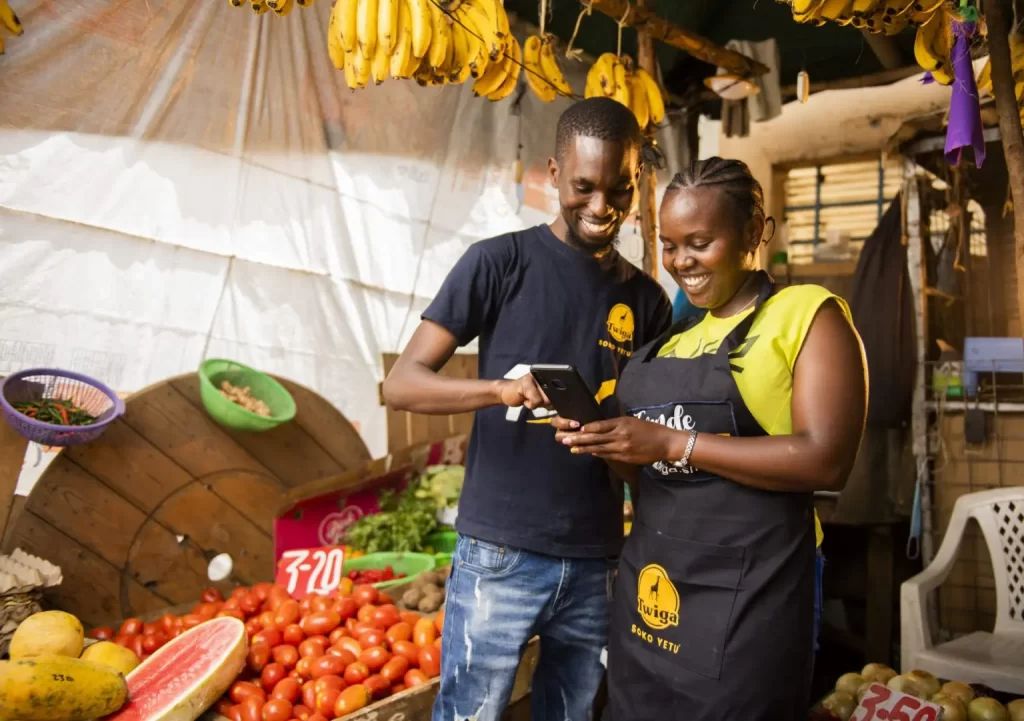Twiga Foods, founded by Peter Njonjo and Grant Brooke has been among the fastest-rising companies in Kenya and has been named one of the most innovative firms in Africa by Fast Company.
Its most recent funding round was US$ 50 million (approximately Kshs. 600 million) from a funding series led by Credeav the total amount ever raised by the firm to approximately US$ 157.1M. The firm is worth US$ 200 – 300M.
Key Takeaways
- Twiga Foods deals with Mama Mboga (Small Scale Green Grocery Retailers)
- They use a very simple business model: buying in bulk and selling in retail (B2B)
- Their focus has been on fresh farm produce and aims to bring food security to Africa
- They redefined the market previously held by Mkokoteni Haulers (Lone guys pulling carts full of produce to the market)
- They targeted a very underexplored niche – a fragmented produce market.
A History of Twiga Foods
Twiga Foods was started in 2014 by Peter Njonjo and Grant Brooke with the goal of reducing the fragmentation in the fresh produce market.
Peter Njonjo has been the CEO since 2014 and he holds a track record of heading corporate operations. He was previously the President of Coca-Cola West Africa and has also been a manager for Coca-Cola East Africa. He is a graduate of Harvard Business School.
Grant Brooke, the co-founder, had studied the African informal markets for a long period before settling on the Twiga business idea. He was born and raised in Texas. He stepped down from his role at Twiga and went on to found Shara – a payment solution for SMEs in Kenya and Nigeria.
Since 2014, the firm claims to have served about 140,000 customers representing nearly 25% of the entire small-scale fresh produce market. A few statistics about them are that they source from over 1,000 farmers, do over 12,000 deliveries daily, operate in 12 cities, and have about 1,800 employees.
The statistics are summarized in the table below.
| Founded | 2014 |
| Employees | 1,800 + |
| Vendors (Small Scale Retailers) | 140,000 + |
| Daily deliveries | 12,000 + |
| Farmers | 1,000 + |
| Operations | 12 cities |
| Estimated Yearly Revenue | US$ 10M |
*Data sourced from Twiga Foods website.
They have also grown their use of technology ever since to now having a web app (Soko Yetu) and a toll-free call center.
Since its inception, the firm has had 4 rounds of raising funding as summarized below.
| Funding | Amount | Year | Source |
| Seed Round | US$ 1.75M | 2016 | Co-founders |
| Series A | US$ 10.3M | 2017 | Wamda Capital |
| Series B | US$ 30M | 2020 | Goldman Sachs |
| Series C | US$ 50M | 2021 | Creadev |
So far, the firm has raised a total of US $157.1M from 23 investors across 19 rounds.
The estimated worth of Twiga Foods is US$ 200 – 300M.
There have also been plans to distribute the government’s Hustler Fund – 300M of it – through the company.
Mama Mboga Concept – Market Gap
The business model of Twiga Foods is simple and tied to the Mama Mboga concept.
They buy food supplies in bulk and distribute them to Mama Mboga kiosks (small-scale retailers) every day. So, the gap they are bridging is that of supplying fresh produce to small retailers.
Twiga Foods said they identified a problem where ‘mama mbogas’ have to wake up so early every morning to get their stock from various fresh produce markets using Mkokoteni’s. So, Twiga Foods started by buying Tuk Tuks which carried bananas to these vendors. Their portfolio of fresh produce has ever since increased to 15 different products.
If you were to ask the founders Twiga Foods, they would tell you the informal (and unregulated) markets have largely unexploited business potential.

Supplying Fresh Farm Produce at Scale
It would be easy to think that the amounts ‘Mama-mboga-size’ retailers would pay for a company to deliver fresh produce to their stalls is negligible but if you do the math of supplying over 17 products to around 2,500 retailers every day, then it adds up to millions.
This is the secret that Twiga Foods figured out and made into a business.
According to the company’s records, the founders invested around Kshs. 30 million in the first year and made revenues of Kshs. 25 million. This revenue was at a time when they were only supplying bananas and pineapples to retailers so their revenue is currently significantly much more.
While it seems absurd that a company whose main competition is Mkokoteni guys who transport fresh produce between markets, farmers and retailers would receive Kshs 300 million in funding, the critical element of Twiga Foods’ is the formalization of their operation.
They, for instance, describe themselves as a ‘technology-driven’ business since they have built a platform that makes all their operations seamless.
Competing with Mkokoteni Haulers
Any rational investor would want to fund a venture that has shown proof of concept and with potential for growth. This is exactly what the founders at Twiga Foods achieved.
They set up a company that does what Mkototeni and lone businessmen were doing, added a formal structure of operation and displayed clear value addition.
One of the founders sold his house in order to finance the start of Twiga Foods and place it on the map of venture capitalists.
While describing their experience in Washington DC where they had gone to pitch their idea, Peter Njonjo and Grant Brooke recall being among other entrepreneurial heavyweights all across the globe. They triumphed over these other entrepreneurs.
Advising Farmers on Improving Produce
Worth mentioning also is that the value that Twiga Food adds cuts across the fresh produce supply chain given that they are acting as advisors to farmers (by giving them training) and at the same time solving the supply side problem for small-scale retailers.
They also are acting as a buffer to some of the market prices because they can hold prices constant for the farmer all year round and hence stabilize farming practices.
This price buffering practice is part of value addition to farmers.
Overall, Twiga Foods is a golden example of how ideas that seem simplistic can be grown into sustainable businesses.
Before Twiga Foods, it would have been hard to imagine that formalizing what Mama Mboga and the Mkokoteni guys do could result in one of the fastest-growing companies in Kenya and Africa.



















